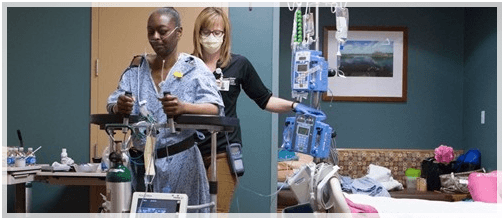
Inpatient and Outpatient Services

Inpatient Neurological Rehabilitation
To qualify for inpatient rehabilitation, patients must:
- Be diagnosed with neurological deficit from trauma or disease, a brain injury, or stroke
- Have limitations in self-care, mobility, bowel and bladder management, or communication or suffer from cognitive impairment
- Be medically stable and have stable respiratory function (no mechanical ventilation needed)
- Be able to participate in a minimum of 3 hours of therapy each day
- Have the potential to improve through treatment in an interdisciplinary setting
- Have at least two functional impairments
- For the Pediatric Program, patients must be between the ages of 1and 13 years old. Adolescents aged 14 to 18 years old can be treated in one of the adult programs or in the pediatric program, depending on their needs.
- For the Stroke Program, patients must have a family member or other designated caregiver committed to caring for the patient on discharge.
Patients also may benefit from other services:
- neuropsychological testing and counseling
- respiratory therapy
- orthotics and prosthetics
- patient and family education
- secondary injury prevention
Special Programs
Aquatic Therapy Program
Barrow developed its aquatic therapy program to benefit patients in need of cardiovascular exercise as part of their rehabilitation. Therapists specializing in aquatic therapy lead patients with limited physical abilities through exercises to improve their range of motion, strength, flexibility, balance, coordination, and endurance. Patients also learn adapted swimming techniques and gait retraining. Besides its therapeutic benefits, aquatic therapy is energizing, refreshing and, for many, an enjoyable aspect of their rehabilitative regimen.
Community Reintegration Program
Returning to life is the primary goal of rehabilitation. Therefore, programs pioneered by Barrow place patients with newly acquired skills in real-life settings. Typical reintegration sessions may include visits to and experiences in restaurants, grocery stores, or sports and entertainment events. Barrow offers this unique program to its patients because reintegration is critical to their independence in the community. Community reintegration includes training in wheelchair mobility skills, assertive communication skills training, and structural barriers and therapy related to help patients adjust to a new body image. Members of the neurorehabilitation team also advise patients about their rights under the American with Disabilities Act (ADA).
“I was really scared the first time I went out. I thought, are you crazy? We are going to a baseball game and I have to push my wheelchair and open doors. I am glad I went! Now when I go on a date, I open the door.”
-Curtis Neil, patient
Peer Mentoring Program
The Peer Mentoring Program matches newly injured patients with a mentor who has also experienced a life-altering injury and now enjoys a healthy, active life. During the program, patients and their mentors discuss topics such as body image, maintaining a healthy recreational lifestyle, traveling, dating, work and school re-entry, and using humor as a coping skill.
“It was great to talk to someone who plays sports, drives, and goes to school and on dates. It was awesome to be able to talk to someone who has been through what I am going through. It’s like I’m not going through this alone.”
-Jim Boomer, patient
Outpatient Neurological Rehabilitation
Barrow’s outpatient rehabilitation program, which is accredited by the commission on Accreditation of Rehabilitation Facilities, offers many services.
- Individualized treatment plans
- Flexible therapy scheduling
- Direct training with employees and teachers during home and community reentry transitions
- Coordinated team approach to patient rehabilitation
- Education for about community programs patients and families
How can we help?
For more information, please call 1-800-BARROW1 (227-7691) or (602) 406-6281, or fill out our contact request form.
